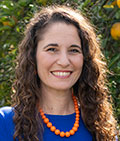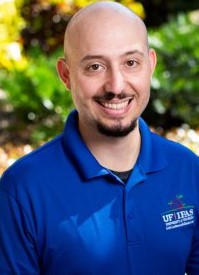In their fourth such clinic, faculty from UF/IFAS and the UF College of Medicine will test farmworkers for chronic diseases from 8 a.m. to 2 p.m. March 23 in Arcadia.
The screenings will be at the Turner Agri-Civic Center, 2250 NE Roan St. The clinic will be held in conjunction with a UF/IFAS Extension agricultural employee safety training at the same place and time.
Ajia Paolillo, multi-county citrus agent for UF/IFAS Extension, conducts the annual safety program to provide agricultural workers and pesticide handlers necessary training on topics such as pesticide safety, equipment safety, using personal protective equipment and first aid.

“Safety training is available in both English and Spanish sessions, to remove the language barrier and assist participants with understanding the information,” Paolillo said.
Other UF/IFAS Extension agents teaching at the safety program are Jonael Bosques, Luis Rodriguez, and Lourdes Pérez Cordero, along with industry partner Kieth Hollingsworth.

Dr. Norman Beatty, a UF assistant professor in the department of medicine, will lead a team that will test participants for chronic diseases that often go unrecognized but can have a major impact on someone’s health. Those include high blood pressure, depression, diabetes mellitus, high cholesterol, anemia and Chagas disease.
Across America, more than 300,000 people are infected with Chagas, but less than 1% have been diagnosed, said Beatty.
Beatty is pioneering a program researching the prevalence of Chagas in Florida because it has been estimated that at least 18,000 are infected in the state.
UF faculty and their students fill a huge health void with the clinics. Of the estimated 200,000 farmworkers in Florida, few of them or their families receive the care they need, according to organizers.

“We hope to increase access to health care resources to help mitigate the health disparities that exist in these communities,” said Diaz, a UF/IFAS associate professor of agricultural education and communication. “We will be providing health screenings and care – including vaccinations for adults and children — which will be administered by our partners at the Florida Department of Health.”
Last year, CAFÉ Latino and the UF College of Medicine tested about 2,000 farmworkers and their families. They’ve taken their clinic and educational materials to Wimauma twice and to Wauchula once.
“The health of our farmworkers is something we are passionate about,” says Beatty. “Working as a multi-disciplinary team, we are creating a network across Florida to serve our farmworkers who are in need of these resources.”
Beatty said teamwork is the key to provide better health access to farm laborers.
“Treatments and medical management are needed for those living with these chronic diseases but without awareness of these conditions they will surely go unnoticed,” he said. “It is exciting to see our teams at CAFÉ Latino and the UF College of Medicine joining forces to help our farmworkers and their families live happy and healthy lives. We truly do appreciate everything they do for our communities.”
Para accesar a esta comunicación en español, por favor utilice el presente enlace
-30-
The mission of the University of Florida Institute of Food and Agricultural Sciences (UF/IFAS) is to develop knowledge relevant to agricultural, human and natural resources and to make that knowledge available to sustain and enhance the quality of human life. With more than a dozen research facilities, 67 county Extension offices, and award-winning students and faculty in the UF College of Agricultural and Life Sciences, UF/IFAS brings science-based solutions to the state’s agricultural and natural resources industries, and all Florida residents.
ifas.ufl.edu | @UF_IFAS
 1
1
